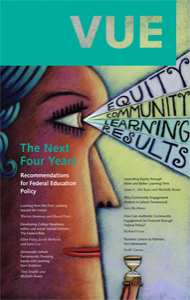The standards-based, market-driven reforms favored over the last four years by federal education policy address important needs – but to achieve meaningful reform at scale, a broader, more equitable approach is needed.
The Next Four Years

The current standards- and market-based federal education policies are necessary, but not sufficient to achieve sustainable reform at scale. How can federal policy support a more robust, equitable, and comprehensive approach?
The federal government can support college readiness by fostering organizational partnerships that coordinate services, share data, and smooth the transition from high school to college.
Current federal school turnaround policy has not achieved the desired results – more emphasis is needed on investment in teaching and learning, supports to struggling schools, community engagement, and broader assessments.
College readiness calls for tapping the resources of the whole community – higher education, community organizations, businesses, funders, and civic organizations – to support and align learning inside and outside of schools.
Research shows that an authentically engaged community improves schools – not just by participating in school events, but also by helping to shape reform.
A robust body of research shows that authentic community involvement in improving schools is key to sustainable and successful reform; how can that goal be translated into federal policy?
The work of teachers unions in Chicago and nationwide offers a promising model of teacher and community engagement.







